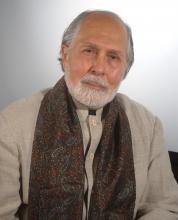The first Muslim to deliver the Gifford Lectures, Seyyed Hossein Nasr is a pioneer who has bridged Islamic studies with the world of Western philosophy, science and religion. He was born 7 April 1933 in Tehran, Iran, into a prominent family. Both his father and grandfather served as physicians to the Iranian royal family. When Nasr was twelve, he moved to the United States to attend the Peddie School in Highstown, New Jersey, where he was valedictorian of his class in 1950.
Nasr was the first Iranian undergraduate student at the Massachusetts Institute of Technology, where he chose to study physics and mathematics. During his second year at MIT, Nasr’s academic outlook changed when he discovered that the physical sciences would not provide answers to the metaphysical questions with which he was struggling. It was then that he began to explore the humanities and philosophy. After graduating from MIT in 1954 with a B.S. degree, Nasr entered the graduate program in geology and geophysics at Harvard University. He received a M.S. in geology and geophysics in 1956, and a Ph.D. in the history of science and learning, with specialization in Islamic cosmology and science at Harvard University under the supervision of I. Bernard Cohen, Hamilton Gibb and Harry Wolfson. After receiving his Ph.D. in 1958, Nasr decided to return to Iran even though he was offered a position as assistant professor at MIT.
From 1958 until 1979 Nasr was professor in the history of science and philosophy and was named the dean of the Faculty of Letters at Tehran University. At the age of thirty he was the youngest person to become a full professor at Tehran University. Nasr visited America several times as a guest lecturer, including returns to Harvard in 1962 and 1965. In 1964–1965, he spent an academic year at the American University of Beirut as the first Aga Khan Professor of Islamic Studies. In 1966 Nasr delivered the Rockefeller Lectures at the University of Chicago.
Nasr was appointed President of Aryamehr University by the Shah of Iran in 1972 and in 1973 the Queen of Iran appointed Nasr to establish a centre for the study of philosophy. Under Nasr’s skilful guidance the Imperial Iranian Academy of Philosophy was established and quickly became one of the most important centres of philosophical activities in the Islamic world. Nasr was the first president of this centre; under his guidance it developed an extensive library of philosophy and attracted some of the most distinguished scholars in the field, both from the East and the West.
Because of the Islamic revolution in Iran, Nasr returned to the United States with his family and in 1979 he became the first distinguished Professor of Islamic Studies at the University of Utah. From 1979 to 1984 he was Professor of Islamic Studies at Temple University in Philadelphia, and since 1984 he has been the University Professor of Islamic Studies at George Washington University, Washington, D.C. In 1983 Nasr delivered the Wiegand Lecture on the philosophy of religion at the University of Toronto 1n 1983 and the Cadbury Lectures at the University of Birmingham in 1994.
Nasr has published numerous books, including: his dissertation, An Introduction to Islamic Cosmological Doctrines (1964); Science and Civilization in Islam (1968); The Encounter of Man and Nature: The Spiritual Crisis of Modern Man (1968); Islamic Science: An Illustrated Study (1976); Western Science and Asian Cultures (1976); Islamic Life and Thought (1981); his Gifford Lectures, Knowledge and the Sacred (1981); The Young Muslim’s Guide to the Modern World (1993); The Need for a Sacred Science (1993); The Islamic Intellectual History in Persia (1994); his Cadbury Lectures, Religion and the Order of Nature (1996); Man and Nature: The Spiritual Crisis in Modern Man (1997); The Heart of Islam: Enduring Values for Humanity (2002); and Islam: Religion, History, and Civilization (2003).



